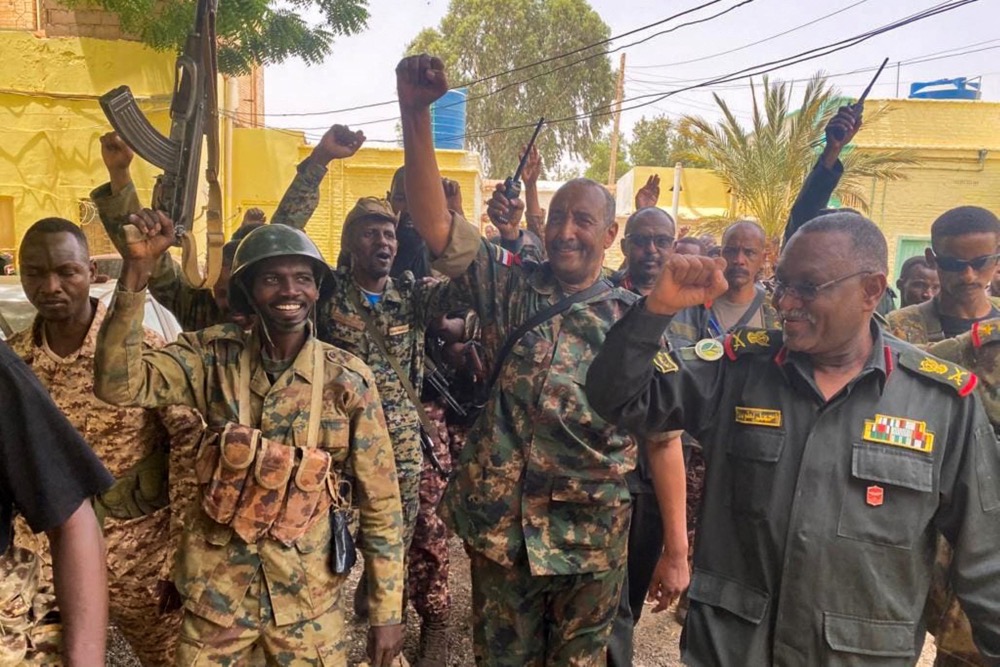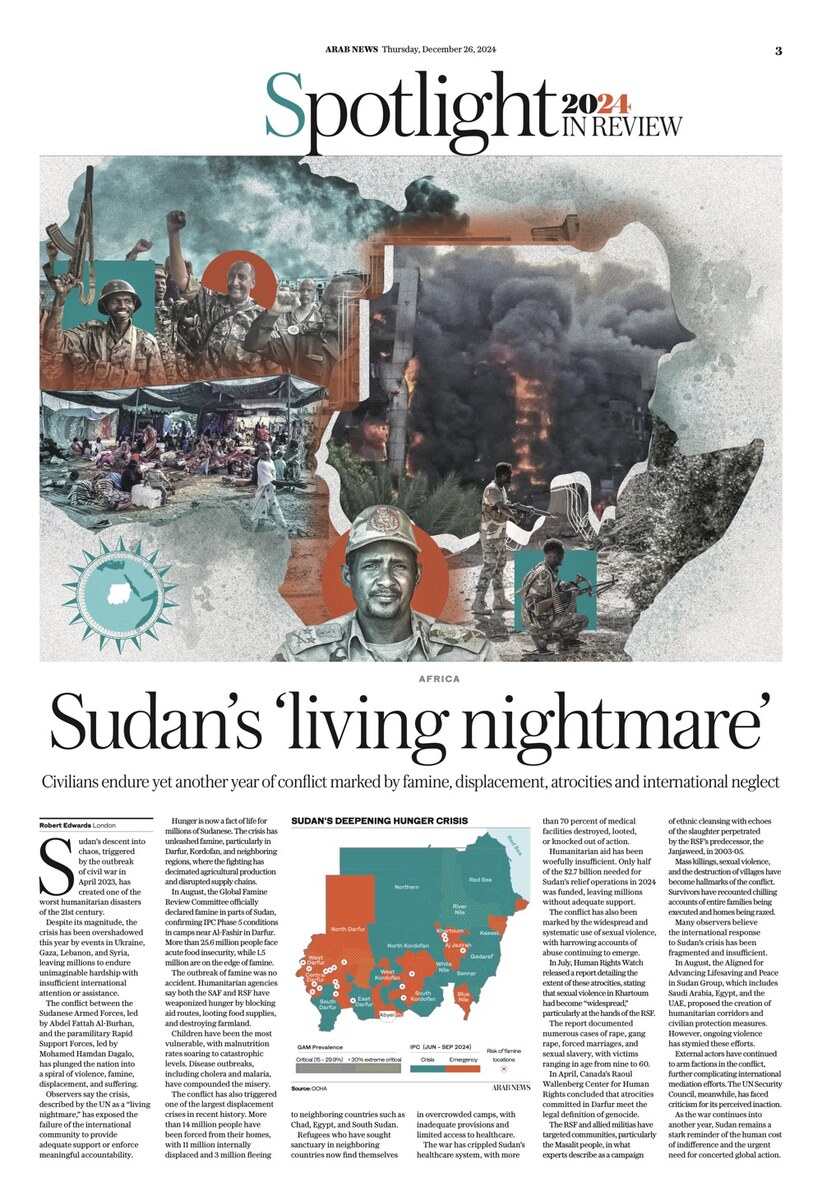JERUSALEM: Nabela thought the United Nations school in Gaza City was a safe haven. Then, the Israeli army arrived.
Soldiers stormed the place, ordering men to undress and hauling women to a mosque for strip searches, she said. So began six weeks in Israeli custody that she says included repeated beatings and interrogations.
“The soldiers were very harsh, they beat us and screamed at us in Hebrew,” said the 39-year-old from Gaza City, who spoke on condition that her last name not be used for fear of being arrested again. “If we raised our heads or uttered any words, they beat us on the head.”
Palestinians detained by Israeli forces in Gaza during the Israel-Hamas war have alleged widespread physical abuse and neglect. It’s not known how many women or minors have been detained.
Nabela said she was shuttled between facilities inside Israel in a coed group before arriving at Damon Prison in the north, where she estimated there were at least 100 women.
Rights groups say Israel is “disappearing” Gaza Palestinians — detaining them without charge or trial and not disclosing to family or lawyers where they’re held. Israel’s prison service says all “basic rights required are fully applied by professionally trained prison guards.”
Israel declared war after Hamas-led militants killed about 1,200 people and took roughly 250 others hostage on Oct. 7.
Since then, ground troops have arrested hundreds of Palestinians to search for suspected militants and gather intelligence. Images of blindfolded men kneeling, heads bowed and hands bound, have sparked worldwide outrage. In northern Gaza and the southern city of Khan Younis, troops rounded up dozens at a time from UN schools and hospitals, including medical personnel.
The military said it makes detainees undress to search for explosives, bringing detainees into Israel before releasing them back into Gaza if they’re deemed innocent.
For Nabela, that process took 47 harrowing days.
Despite Israeli evacuation orders, Nabela and her family had decided not to leave Gaza City, believing nowhere in Gaza was safe. Troops entered the school where they sheltered on Dec. 24.
“I was terrified, imagining they wanted to execute us and bury us there,” she said.
Forces separated Nabela from her 13-year-old daughter and 4-year-old son and loaded her onto a truck bound for a facility in southern Israel. According to the Israeli group Physicians for Human Rights-Israel, or PHRI, all detainees in Gaza are first brought to the Sde Teiman military base.
“We were freezing and forced to remain on our knees on the ground,” Nabela told The Associated Press from a school-turned-shelter in Rafah where she’s staying with other recently released female detainees. “Loud music, shouting and intimidation — they wanted to humiliate us. We were handcuffed, blindfolded, and our feet were tied in chains.”
Moved between several prisons, Nabela said she was subjected to repeated strip searches and interrogations at gunpoint.
Asked about her connection to Hamas and knowledge of the militants’ extensive underground tunnel network, she maintained her innocence, telling interrogators she was a housewife and her husband worked for Hamas’ rival, the Palestinian Authority.
‘AN APPARATUS OF RETRIBUTION AND REVENGE’
One woman detained from Gaza, who spoke on condition of anonymity for fear of another arrest, told the AP that during a medical check before she was moved to Damon Prison, Israeli forces ordered her to kiss an Israeli flag. When she refused, a soldier grabbed her by the hair, smashing her face into a wall, she said.
In a report by PHRI, former detainees from Gaza alleged similar mistreatment.
One, whose name was redacted, said he was urinated on by guards at Ketziot Prison in southern Israel, and witnessed strip searches where guards forced naked detainees to stand close to each other and inserted search devices into their buttocks.
PHRI described Israel’s prisons, also housing Palestinians from the West Bank and east Jerusalem held on security-related charges, as “an apparatus of retribution and revenge.” It alleged the prison service and military “have been granted free rein to act however they see fit.”
At the beginning of the war, prisons entered “lockdown mode,” confining detainees to their cells for two weeks, the report said. Under wartime emergency measures, Israel’s parliament in October suspended normal cell capacity requirements. Since then, inmates have slept on mattresses in overcrowded cells.
Phone privileges have been completely suspended, the report said. At some facilities, security wings were disconnected from electricity and water, plunging detainees into darkness for most of the day and rendering showers and sinks unusable.
During eight days at an unknown facility in southern Israel, Nabela said she did not shower and had no access to menstrual pads or toiletries. Food was scarce. Once, Nabela said, guards threw down the detainees’ meals and told them to eat from the floor.
The military said each detainee receives clothing, blankets and a mattress. It denied that cells were overcrowded, saying detainees had sufficient access to toilets, food, water and medical care.
“The violent and antagonistic treatment of detainees described in the allegations is prohibited,” the military said in response to an AP request for comment. “Cases of inappropriate behavior will be dealt with.”
It referred questions about Ketziot and Damon prisons to the Israeli Prison Service, which did not comment on the allegations beyond saying it was uninvolved in the arrests and interrogation of Palestinians from Gaza.
‘UNLAWFUL COMBATANTS’
Nabela said she never spoke with a lawyer or a judge.
Under a wartime revision to Israeli law, all detainees from Gaza can be held for 45 days without charge or trial.
Designated “unlawful combatants,” they aren’t granted the same protections under international law as prisoners of war. Their appearance before a court can be delayed and access to an attorney withdrawn, according to PHRI. The Israeli rights group HaMoked said there are 600 people from Gaza held as unlawful combatants in Israeli prisons, and more could be held in military facilities.
Palestinian detainees told PHRI that adequate medical care was rare, even for those needing insulin or chemotherapy treatments.
An official document obtained by the AP, laying out operations at the Sde Teiman military medical facility, specified that unlawful combatants be treated handcuffed and blindfolded.
Medical staff’s names were kept anonymous “to maintain the safety, well-being and lives of the caregivers,” it said. It did not require patient consent for medical procedures and said confidential medical information could be passed to detention center staff.
The military said the handcuffing of detainees was “done in accordance with their assessed level of danger and medical state.” Israel’s Ministry of Health did not respond to requests for comment.
Eleven Palestinian detainees have died in Israeli custody since Oct. 7, according to the advocacy group the Palestinian Prisoners’ Club, and the most recent was just this week. At least five had chronic health conditions, which PHRI says raises concerns that they died because of medical neglect.
The Israeli military said it would examine the deaths.
‘BETTER THAN GAZA’
Nabela’s fortunes improved when she arrived at Damon. There, she met Palestinian women detained from the West Bank.
She said the women were kind. She had electricity and warm showers. Her interrogator wondered aloud why Nabela was detained.
A month and a half after her arrest, a prison administrator announced Nabela would be released with about 20 other women. Israeli buses brought them to a Gaza crossing, where they made their way to UN shelters in the southern city of Rafah, full of displaced Palestinians. She cannot travel to Gaza City, where her family remains.
Nabela, her face bruised, recalled one of her final interrogations. She had begun to weep, and her interrogator told her:
“Don’t cry about it. You’re better living here than Gaza.”
Palestinian women detained by Israel allege abuse while in custody
https://arab.news/gtexg
Palestinian women detained by Israel allege abuse while in custody

- Six weeks in Israeli custody that included repeated beatings and interrogations
- Rights groups accuse Israel of ‘disappearing’ Gaza Palestinians
































